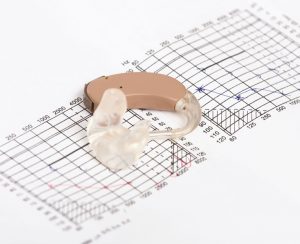Hearing aids are advanced electronic devices designed to improve hearing clarity and quality of life for individuals with hearing loss. At Fort Worth ENT & Sinus, board-certified audiologists provide comprehensive hearing evaluations and personalized hearing aid solutions using the latest digital and Bluetooth-enabled technology. Modern hearing aids are highly customizable, discreet, and capable of reducing background noise while enhancing speech, making them effective for mild to profound hearing loss, including single-sided hearing loss and tinnitus. Professional testing and fitting ensure each patient receives the most appropriate device for their hearing needs and lifestyle.
Fort Worth ENT Audiology Services
Hearing Aids in Fort Worth, TX1
At Fort Worth ENT & Sinus, we offer state-of-the-art hearing aids designed to enhance your hearing and improve your quality of life. Whether you’re experiencing gradual heraing loss or sudden changes, our expert Audiologists are here to guide you through every step of the process
Hearing aids are beneficial for those suffering from hearing loss. Many patients experience a gradual decrease in hearing and may not notice it until they realize that greater effort is needed to hear. Some individuals may have hearing loss in one ear or experience ringing that makes communication even more challenging. A loss of hearing in one ear poses additional difficulties in communication. State-of-the-art hearing aids are offered at Fort Worth ENT, and our physicians and audiologists will help you choose the most appropriate hearing aid.
How do Hearing Aids Work?
Hearing aids are small electronic devices that help people with hearing loss experience sounds more clearly. They contain tiny microphones that capture sounds from the environment, such as speech and background noise. Once the sounds are collected, they are processed digitally within the hearing aid. This involves analyzing and adjusting the sounds based on the user’s specific hearing loss and unique hearing needs, which an audiologist or hearing specialist can set. After processing, the sounds are converted back into waves and amplified, making them louder and clearer. These enhanced sounds are delivered directly to the ear through a small speaker, helping the user hear and understand speech more effectively. For those who have hearing loss in one ear and ringing, modern hearing aids can provide specific amplification and relief for that side, improving clarity and reducing discomfort. Today’s hearing aids are highly customizable, allowing adjustments for different settings, such as quiet rooms, busy environments, or even music, to provide the best listening experience in various situations.
If you would like an appointment with one of our physicians at Fort Worth ENT & Sinus please complete an online appointment request or phone 817-332-8848.
How Do I Know If I Need Hearing Aids
How Do I Know if I Need Hearing Aids?

The best way to find out if you could benefit from wearing hearing aids is through testing for audiology and hearing loss. Because of the typically gradual onset, hearing loss in one ear or both may not be recognized by the person who suffers from it. Hearing aids are beneficial for those suffering from hearing loss.
Signs that you may need hearing aids to improve your hearing include:
- Frequently asking people to repeat themselves
- Missing parts of conversations or confusing words that are spoken
- People around you begin expressing concern about your hearing
- Difficulty hearing phone conversations
- Avoiding social situations due to difficulties with hearing
- Turning up the TV or radio volume to levels that others find too loud
- Difficulty following conversations when background noise is present or in a group
- Ringing or buzzing in the ears (tinnitus hearing loss)
- Trouble hearing outdoor noises, such as the wind or birds
- Lost hearing in one ear or ringing, making it hard to determine sound direction
If you are experiencing these symptoms, contact the professional audiologists at Fort Worth ENT for an evaluation.
Different Types Of Hearing Aids
Hearing Aid Options and Features
Invisible or nearly invisible hearing aids are fitted deeply inside your ear canal to mimic capturing sounds as an ear is designed to do. Generally, no one notices you wearing it, allowing you to wear glasses and use a phone or headset comfortably. However, these hearing aids may not be appropriate for patients with small or curvy ear canals. Larger hearing aids that fit behind and over the ear are also available and suitable for all hearing loss levels and ages. All hearing aids use small batteries that last between 5 to 14 days. While any style can improve hearing loss, it’s important to find the one that best suits your needs—especially if you experience specific issues like hearing loss in one ear and ringing.

In-The-Canal (ITC)
- It covers the ear canal entrance and is molded to fit partially into your ear canal
- Nearly invisible from the front
- Small in size (easier to handle than CIC but harder than ITE)
- Battery life: 1 to 2 weeks
- Improves mild to moderately severe hearing loss
Receiver-In-The-Canal (RIC)
- Small, lightweight, and quick-fitting
- Less visible than hearing aids with custom ear molds
- The receiver sits in the ear canal, connected by a thin wire to the housing behind the ear
- No hard dials or buttons
- Suitable for mild to severe hearing loss
- Battery life: 1 to 2 weeks
Completely-In-The-Canal (CIC)
- The smallest hearing aid available
- Nearly invisible, custom-molded to fit deeply in your ear canal
- It may not be appropriate for those with diabetes, kidney disease, poor circulation, severe hearing loss, or those prone to infections
- Battery life: 5 to 7 days
In-The-Ear (ITE)
- Custom-made to fit within the bowl (concha) of your ear
- Available in two styles: one that fills the concha and one that fills only the lower portion
- Includes volume control, which smaller hearing aids lack
- It may be more difficult to use on the phone, though specialized technology can assist
- Suitable for a wide range of hearing loss
- Battery life: 1 to 2 weeks
Behind-The-Ear (BTE)
- Hooks over the top of the ear, with a small tube attached to a custom-molded piece that fits into the ear canal
- Appropriate for all ages and all levels of hearing loss
- Largest style, though newer designs are becoming more discreet
- It may pick up more wind noise than other types
Open-Fit
- A variation of the BTE hearing aid that uses a small tube to amplify high-frequency sounds
- It keeps the ear canal very open, allowing low-frequency sounds to be heard naturally
- Less visible than traditional BTE styles
- Suitable for mild to moderate hearing loss
Which Hearing Aid Is Right For Me?
Choosing Hearing Aids
At the Fort Worth ENT Hearing Center, we offer many hearing aid options and features while working closely with each individual patient to provide the hearing aids that best suit his or her needs.
Some factors that help determine which hearing aid is right for you include:
- Preferred style of hearing aid
- Severity and type of hearing loss you have
- Budget
- Lifestyle (career and social) demands that need to be met
- Surroundings that you spend your time in
- Any physical challenges
- Comfort level with technology
- Once you have chosen the hearing aids that are best for you, your audiologist will schedule a time for your initial fitting during which levels will be adjusted and features fine-tuned. We will also instruct you on:
- Inserting and removing your hearing aids
- Cleaning and caring for your hearing aids
- Changing your hearing aid batteries
Improvements in The Modern Hearing Aid
Technology has transformed the experience of wearing hearing aids, making them more comfortable, functional, and accessible than ever before. One of the most significant advancements is the integration of Bluetooth, which allows users
to connect their hearing aids to various devices wirelessly. With Bluetooth, sounds from a cell phone, tablet, or television can be transmitted directly to both hearing aids, creating a clear, balanced listening experience. This eliminates the need to hold a phone to one ear or struggle with external speakers, making conversations and media more enjoyable and convenient.
This same Bluetooth functionality extends to other devices, such as computers, iPads, and music players, allowing users to switch seamlessly between devices without removing or adjusting their hearing aids. For people who frequently interact with technology, this feature makes hearing aids an integral part of their digital lives, enabling them to fully participate in phone calls, video calls, streaming, and music without additional accessories. Moreover, the ease of pairing and compatibility with multiple devices means that users can feel confident their hearing aids will integrate smoothly with the technology they already use.
Modern hearing aids are also designed to meet various needs, from mild to profound hearing loss. They are available in different styles and fits to match personal preferences, age, and lifestyle. For individuals who have hearing loss in one ear and ringing or need a device to address lost hearing in one ear, specialized options are available to provide balanced sound and relief from symptoms. Whether you’re looking for a device that blends in discreetly, offers robust features for active lifestyles, or prioritizes comfort for all-day wear, today’s hearing aids offer a wide range of options to support every user.
To learn more about hearing aid technology or to ask a professional if a hearing aid is right for you, call us today at 817-332-8848. We are qualified audiologists who can help you find your perfect hearing aid in Fort Worth, TX!
Hearing Aid Technology
Hearing Aid Technology
Background noise can sometimes be a problem when you get hearing aids. While these noises cannot be completely eliminated, hearing aids are now available that can amplify the sounds you want to hear while minimizing unwanted noise. FM technology used in assistive listening devices is especially effective at reducing background noise as well.
The wireless technology used in many hearing aids allows the two hearing aids to perform as a complete system rather than 2 individual devices. In this way, the hearing aids mimic the ears’ normal functionality.
Wireless technology also allows patients to program and customize their hearing aids with such features as Bluetooth capability to connect to electronic devices like mobile phones, computers, and TVs. Digital technology offers greater flexibility in hearing aids since they can now be programmed to amplify specific frequencies, and the sound quality continues to get better as more advancements are made in the digital hearing aid field.
Adapting to Hearing Aids
Adapting to Hearing Aids
The purpose of wearing hearing aids is to improve your hearing rather than to restore your hearing perfectly. Knowing what to expect from your hearing aids will help you become accustomed to them more easily. Because hearing is typically lost over the course of many years, it may take some time to get used to hearing sounds again.
For most patients, this adjustment period can be a few weeks to months. Patients with more severe hearing loss for longer periods usually require a longer time to become acclimated. The audiologists at Fort Worth ENT will patiently work with you during the rehabilitative program.
Often, hearing aids will need additional adjustments as you begin to get used to wearing them.
Tips for getting the most benefit from these adjustments include:
- Wear your hearing aids as often as you can. This allows you to be more accurate about what adjustments may need to be made.
- Keep a log of situations and circumstances during which your hearing aids are not performing in an optimal manner.
- Be patient and positive. Most hearing aids require 2-3 adjustments, so try not to get frustrated.
- Once they are properly fitted and adjusted to your needs, your hearing aids can:
- Improve hearing in noisy settings
- Increase the ability to identify the location of sounds
- Enhance sound quality
- Improve your ability to hear softer sounds
The professional audiologists at Fort Worth ENT are here to help, so do not hesitate to contact us if you have questions or concerns about your hearing aids.
For hearing loss, we have state-of-the-art hearing devices available from several major manufacturers. We will evaluate your individual needs, and help you select the style, technology, and brand that will be best for you.
If you have questions concerning audiology and hearing loss in Fort Worth, TX, or would like an appointment with one of our physicians at Fort Worth ENT & Sinus please complete an online appointment request or phone 817-332-8848.
Frequently Asked Questions
Hearing aids amplify sounds, making hearing speech and other sounds easier in various environments. They are designed to pick up sounds, process them, and deliver them to your ear at an optimized volume based on your hearing needs.
Experiencing hearing loss in one ear and ringing (tinnitus) can be caused by various conditions, such as an ear infection or noise-induced damage. Consulting our audiologist can help diagnose the cause and recommend appropriate treatment or hearing aids if needed.
Hearing aids come in several styles, including behind-the-ear (BTE), in-the-ear (ITE), and completely in-canal (CIC) options. Each type has different features and benefits suited to various levels of hearing loss and lifestyle needs.
Yes, certain hearing aids and assistive devices are specifically designed to aid individuals who have lost hearing in one ear. These can amplify sounds and help improve spatial awareness and sound localization, making it easier to hear in different environments. Our audiologist can recommend the best options based on your specific needs.
If you frequently ask people to repeat themselves, struggle to follow conversations or turn up the TV volume louder than others prefer, you may benefit from hearing aids. Our audiologist can conduct a hearing test to determine if hearing aids are right for you.


